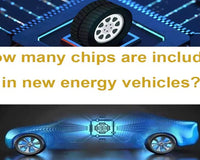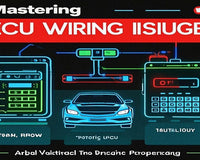From minor inconveniences like a malfunctioning radio to major safety and performance concerns. Modern cars rely heavily on their electrical systems, encompassing critical components like the engine control unit and infotainment system. It is the nervous system of your car which controls everything (from starting the engine to illuminating the lights). Any issues in this system can ruin your driving experience, leaving you stranded on the road.
When you turn the key and your car does not seem to respond. It’s the worst nightmare that every driver can relate to. Understanding these problems is the first step toward resolving them, helping you maintain your car's performance and reliability and saving you time and money on costly repairs.
What Can Cause an Electrical Failure in a Car?
1. Battery Issues
The battery is a critical component of a car's electrical system. A dead or weak battery can prevent the car from starting and may cause other electrical components to malfunction. Corrosion on battery terminals can also lead to poor connections, resulting in intermittent electrical issues.
2. Alternator Failure
The alternator is responsible for charging the battery while the engine is running. If it fails, the battery will not receive a charge, leading to electrical failures as the battery drains. Symptoms of a failing alternator include dimming lights and electrical accessories that do not work properly.
3. Faulty Sensors and Computer Systems
Modern vehicles rely heavily on electronic control units (ECUs) and sensors to manage various functions. Malfunctions in these systems can lead to erratic behavior, such as warning lights on the dashboard or failure of critical systems like the engine or transmission
4. Grounding Issues
A poor ground connection can lead to a variety of electrical problems. Grounding issues can cause components to behave erratically or fail to operate altogether. Ensuring that all ground connections are clean and secure is essential for proper electrical function.
5. Blown Fuses
Fuses protect electrical circuits from overloads. A blown fuse can cause specific electrical components to stop working. Identifying and replacing blown fuses is often a straightforward fix, but repeated fuse failures may indicate a deeper electrical issue.
6. Wiring Problems
Wiring issues, such as frayed wires, loose connections, or damaged insulation, can create short circuits or open circuits, leading to various electrical problems. These issues can be difficult to diagnose as they may not always be visible. You can test it with a multimeter .
.
7. Environmental Factors
Moisture, dirt, and extreme temperatures can affect electrical components. For instance, water intrusion can lead to corrosion and short circuits, while extreme heat can cause wires to expand and create loose connections.
8. Aging Components
As vehicles age, electrical components can wear out. This includes everything from the battery and alternator to wiring and connectors. Regular maintenance and inspections can help identify aging components before they fail24.
9. Corroded Battery Cables
Corrosion on battery cables can significantly hinder electrical flow, leading to starting issues and erratic electrical performance. Cleaning the terminals and ensuring a tight connection can help mitigate these problems. If corrosion is severe, replacing the cables may be necessary to restore proper function.
10. Software Glitches
In modern vehicles, software glitches can also cause electrical issues. These glitches may arise from updates or bugs in the vehicle's onboard computer systems, affecting various functionalities. Regular diagnostics and software updates with an ECU programmer can help prevent and resolve these issues.
11. Overloaded Electrical System
Adding aftermarket accessories without proper consideration can overload the vehicle's electrical system. This can lead to blown fuses and malfunctioning components. It's essential to ensure that any additional electrical load is within the vehicle's capacity to prevent issues.
12. Intermittent Problems
Intermittent electrical problems can be particularly challenging to diagnose. These issues may arise from loose connections or components that fail under certain conditions, such as temperature changes. Regular inspections and testing can help identify these elusive problems before they lead to more significant failures.
Electrical problems in cars can arise from various sources, with the most common being a dead or faulty battery. Other frequent causes include a malfunctioning alternator, blown fuses, corroded battery cables, and faulty spark plugs. Wiring issues and problems with the car's computer or sensors can also lead to electrical malfunctions. These issues can manifest as dimming or flickering lights, difficulty starting the car, or complete power loss, making it crucial to diagnose and address them promptly.
By understanding these common causes of electrical problems, car owners can take proactive steps to maintain their vehicles and address issues before they escalate into more significant problems.
What Would Cause Car's Electrical System Fault?









